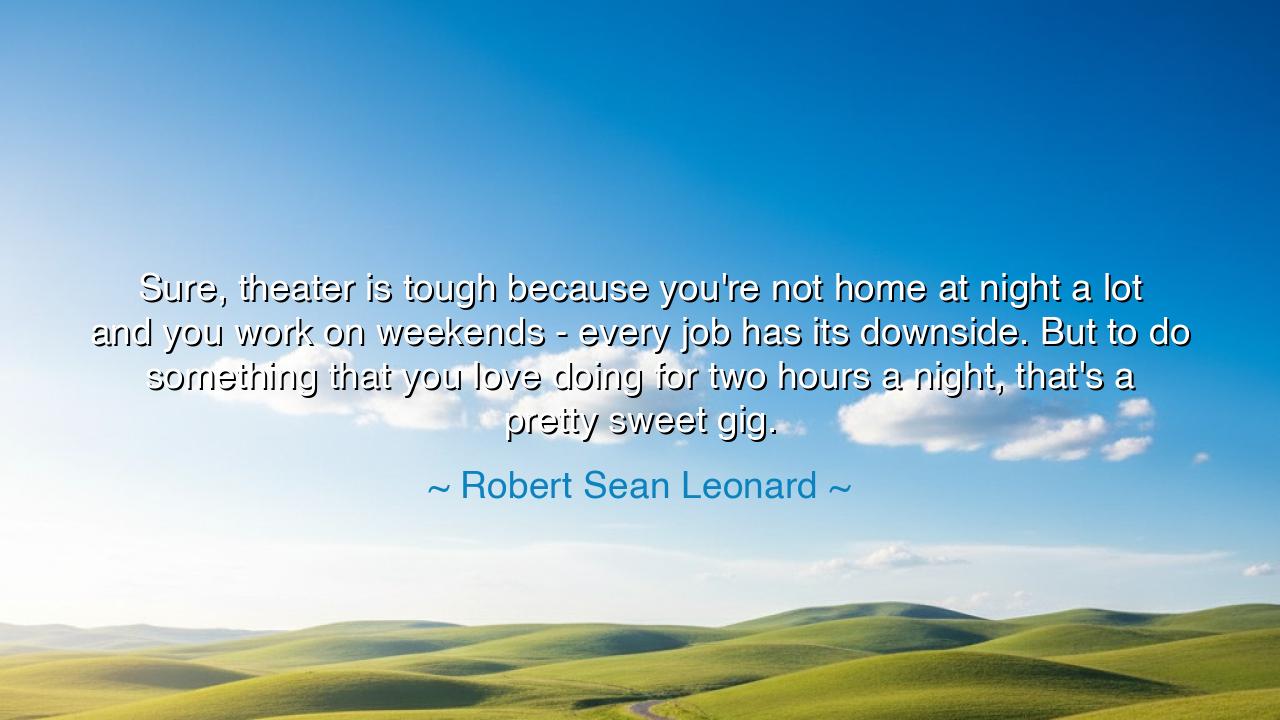
Sure, theater is tough because you're not home at night a lot and
Sure, theater is tough because you're not home at night a lot and you work on weekends - every job has its downside. But to do something that you love doing for two hours a night, that's a pretty sweet gig.






In the dusk-lit hush before the curtain rises, a simple wisdom rings from Robert Sean Leonard: “Sure, theater is tough because you’re not home at night a lot and you work on weekends—every job has its downside. But to do something that you love doing for two hours a night, that’s a pretty sweet gig.” Hear the cadence: duty first, then delight; cost counted, then craft cherished. He does not deny the fatigue—he gives it its name—yet he sets beside it the bright coin of joy: to labor at what the soul was shaped to do.
In the ancients’ tongue we might say: every calling demands a tithe. The farmer surrenders dawn; the sailor yields to the moon’s pull; the actor offers evenings to the altar of applause and silence. Theater is tough because the hour of magic is the hour of rest for others. The house lights dim when most homes grow warm. Yet in that exchange, the player receives a rarer comfort: for two hours a night, the heart stands in its true climate, speaking lines that taste of bread and thunder.
Note how the saying balances scales. On one side: not home at night, weekends, the relentless run, the downside that is no villain, only a price. On the other: the inward rising of craft, the pulse that answers when the stage summons, the gratitude of doing what you love. The sentence refuses both complaint and illusion. It is a pact between realism and reverence: do not pretend this is easy; do not forget this is good.
Consider a tale from the road. An understudy—call her Mira—kept a folded script like a talisman. For weeks she warmed benches, marked beats, whispered cues, and went home under streetlamps while the city slept. One night the lead fell ill; the stage manager’s hand found Mira in the wings. She stepped into the light. She missed a breath, then found it, and the play found her. Afterward she walked home past shuttered shops, alone, aching, beaming. It was midnight. It was work. It was also the evening when years of quiet practice received their answer. That night, “two hours” outweighed a month of fatigue.
History keeps similar ledgers. Sarah Bernhardt crossed oceans by rail and ship to bring tragedy and wit to far cities, playing through injury, scandal, and age. The travel was brutal; the stages were not always grand. Yet audiences rose like wheat before her storm. She paid in miles and gained in meaning. So too did the players of Shakespeare’s company, who hauled planks and poetry together, chasing daylight at the Globe and patronage on the road. Their downside was weather, plague, censorship; their reward was to stand inside words that outlived them. The account books of art are rarely balanced nightly, but they settle, gloriously, across a lifetime.
From this, take the elder’s lesson: joy grows where duty is accepted, not resented. If your craft demands evenings, bless the evening and keep faith with morning. If your path calls you from the hearth, tend the hearth by other means: leave notes, keep rituals, anchor your loves in honest calendars. Let the necessary sacrifice be specific and finite, and let the delight be named and savored—a sweet gig, not because it is light, but because it is yours.
Practical rites for travelers of the stage (and any calling): (1) Schedule your people on your calendar with the same weight as rehearsals; protect them as you protect opening night. (2) Build a recovery ritual—tea, a walk, a stretch—so the body knows how to come down from the lights. (3) Track your hours of practice and hours of joy; if the latter vanishes, adjust the former. (4) Keep a gratitude ledger: after each show, write one line that made you remember why you love this. (5) Accept the downside without drama, and celebrate the two hours a night with ceremony. Do this, and your work will become a school of gladness—demanding, yes, but deeply, enduringly sweet.






AAdministratorAdministrator
Welcome, honored guests. Please leave a comment, we will respond soon